| Beginnings: The
Wolverhampton & Walsall Railway
By the 1860s most of the local manufacturing towns were
easily and quickly accessible by train from Wolverhampton. Two
notable exceptions were Willenhall and Walsall, and although
they already had railway stations it was necessary to change
trains during a circuitous journey. An end to the tedium was in
sight when the Wolverhampton & Walsall Railway was incorporated
on 29th June, 1865. |
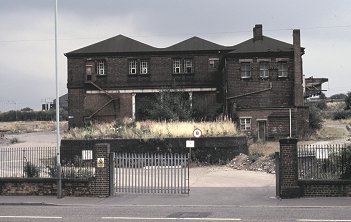
The main entrance into the goods depot
from Wednesfield Road. |
The route was 8 miles long and took 7 years to
complete, and four intermediate Acts were necessary before
operation began. The line started at Wolverhampton High Level
station and ended at Walsall, with five intermediate stations.
They were at Heath Town, Wednesfield, Willenhall, Short Heath, and North
Walsall. The railway opened on 1st November, 1872 and was operated jointly
by the London & North Western Railway and the Midland Railway. |
| Disagreement arose between the two operating
companies and legal proceedings followed, which resulted in the
L.N.W.R. buying the Wolverhampton & Walsall Railway in 1875. The
North Western realised that they would be able to sell the line
to the Midland Railway for a profit because of the building of
the Wolverhampton, Walsall & Midland Junction line,
which would be
an extension from the Midland mainline onto the
Wolverhampton & Walsall Railway, to provide a direct route
into Wolverhampton for the Midland Railway. |
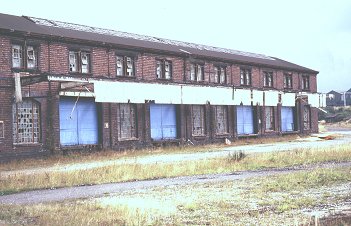
The western side of the depot awaiting
demolition. |
|
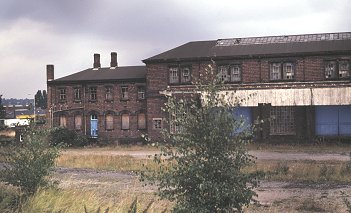
Another view from the west. |
The line was sold to the Midland
Railway on 1st June, 1876 and L.N.W.R. services running on the
line ended on 31st July, 1876. The Midland’s running powers into
Wolverhampton High Level station ended on 30th June 1878 and so
the company decided to build a railway station for passengers in
Wednesfield Road. An Act of Parliament allowing construction was
passed on 28th
June, 1877. |
| On the same day two other Acts were passed, both
for the London & North Western Railway. The first allowed the
company to build a 1.25 mile link to their Grand Junction line
from Wolverhampton High Level, so allowing direct access to
Willenhall and Walsall. The second Act gave permission for the
extension of Wolverhampton High Level station. This was
vigorously opposed by both the G.W.R. and the Midland Railway
because it would restrict access to their stations. |
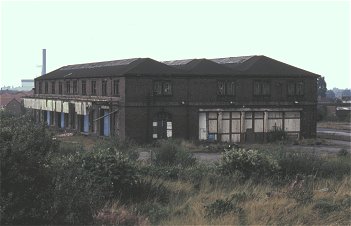
A view of the building from the back of
the site. |
|
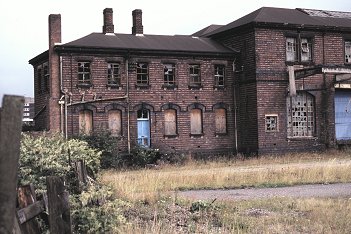
A view of the north western corner of the
building. |
A House of Commons Select Committee looked into
the matter and decided to restrict the growth of the High Level
station and renegotiate the Midland’s right to use it.
The Midland was now faced with a dilemma. It had permission
to build a passenger station in Wednesfield Road, which was no
longer required and so the decision was taken to build a goods
depot instead. |
| Work started on the new depot in November 1878 and
reached completion in November 1881. The depot survived for over
100 years but during its latter years there were a number of
changes.
In 1966 British Rail's goods operations in the West Midlands
centred on the newly remodelled Bescot Yard and most of the
other local goods depots soon closed. |
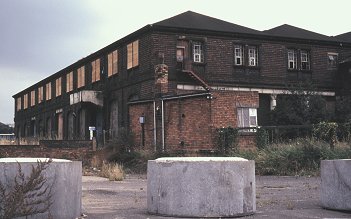
The eastern side of the building. |
|
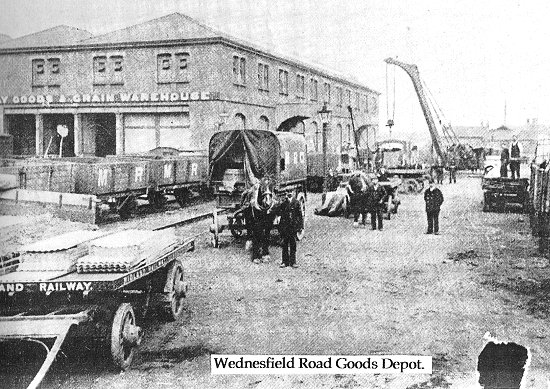
The goods depot in its heyday.
Courtesy of Lynn Stratton. |
|
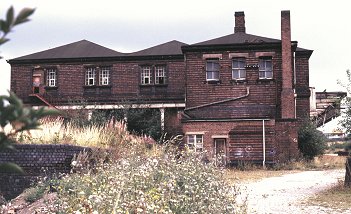
A final view from Wednesfield Road. |
The Midland Railway goods depot was leased to
Railstores Limited but little use was made of the building until
their lease expired in October 1988. By this time the station
had an almost derelict appearance due to lack of routine
maintenance and its future seemed very uncertain.
The building then became part of Wolverhampton steel terminal
and for a while was given a new lease of life. |
|
For a few years it was heavily used but as
the economic climate changed it fell into disuse again. The end
came in the mid 1990s when the building was demolished to make
way for the Royal Mail sorting office.
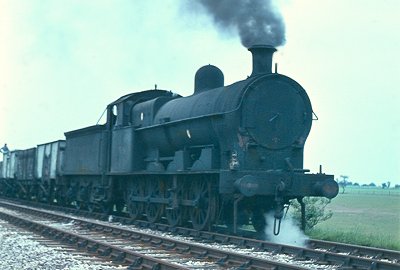
An LNWR Super D photographed
on the line at Bentley Common during the removal of
the cattle bridge. Courtesy of Ray Jevons. |
|
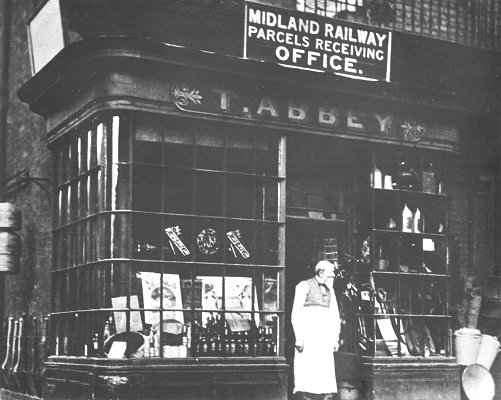
One of the Midland
Railway's parcels receiving offices. Courtesy of
Lynn Stratton. |
In Wolverhampton there were Midland
Railway parcels receiving offices in Ablow
Street, Bilston Road, Coleman Street, Darlington Street, Dudley Road, Great Brickkiln
Street, Horseley Fields, Lichfield Street, Queen Street, Salop Street, Snow Hill, Victoria Street,
and Worcester Street.
If anyone has an further information on the
goods depot, or any photographs of trains or stations on the
line, please send me an email.
|

|
Return to
the
previous page |
|